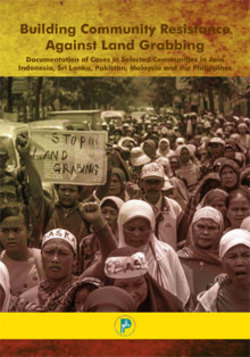PAN AP | 14 October 2013
PAN AP partners launch 'land grabs' book to mark 'World Foodless Day'
The book, "Building Community Resistance against Land Grabbing" documented the experiences of communities of farmers and indigenous peoples. Contributors include PAN AP partners Alliance of Agrarian Reform Movement (AGRA) from Indonesia; Sri Lanka Nature Group (SLNG) and National Fisheries Solidarity Movement (NAFSO) from Sri Lanka; Roots for Equity from Pakistan; Peasant Movement of the Philippines (KMP); and Sarawak Dayak Iban Association (SADIA) from Malaysia.
World Foodless Day is PAN AP and its partner groups' take on the official World Food Day held annually on October 16 to commemorate the establishment of FAO.
"There is a need to monitor and document global land grabs to better understand and expose the phenomenon of intensifying land grabbing in poor countries," said PAN AP executive director Sarojeni Rengam. Ms. Rengam added, "All the compiled case studies have proven that the most compelling issue with land grabbing is food sovereignty. Legality is tilted in favor of foreign investors. Multilateral institutions intervene in national laws. Communities are not consulted; indigenous people are simply driven away from their ancestral lands; and communities' access to natural resources is affected."
The PAN AP official said that there is a direct correlation between hunger and poverty and the access to resources, especially land, of poor farmers. "That land grabbing and the displacement of small farmers continue challenges claims that world food insecurity and hunger are being positively addressed," said Rengam. FAO recently released its "The State of Food Insecurity in the World 2013" report which claimed that the number of chronically hungry people went down from 868 million in 2010-12 to 842 million in 2011-13. It claimed as well that developing nations have supposedly posted significant progress in achieving the hunger target of the Millennium Development Goals (MDGs).
Two case studies were conducted in Sri Lanka - one by SLNG on Soragune, a golf course project and another by NAFSO on Kalpitiya Islands, where tourism development is taking place.
"The land and water resources are precious to the Kalpitiya people and they are deriving sustenance from them. But our case study has documented clear violations of the people's economic, social and cultural rights," said Mr. Herman Kumara of NAFSO. Kumara added that the people of Kalpitiya have increased their awareness and are starting to build 'rights citizenship'. NAFSO held its book launching in Negombo, Sri Lanka attended by the Kalpitiya people and their supporters, including local religious leaders.
AGRA presented two case studies - the Merauke Integrated Food and Energy Estate (MIFEE), which is a biofuels project, and the Merangin case, where forests have been taken over by private companies. Malaysia's case study, prepared by SADIA, meanwhile, documented historical evidence establishing the native customary rights of indigenous communities, which are being violated by a logging company and oil palm plantation. Roots for Equity from Pakistan contributed the Sindh case study, where a foreign export-oriented company is involved while KMP of the Philippines presented the case of Pantaron Village, which also involves a foreign firm.
The book is remarkable because of the direct involvement of community-based organisations confronting land grabbing cases. Through the initiative, local groups were able to use the documentation process to investigate local and/or foreign investments that affect their customary rights and threaten to displace them; consolidate their communities through organizing; and engage in media campaigns to amplify their resistance against land grabbing.
"The cases present stories of people's resistance. In varied degrees of organizational strength, the communities featured in the book have fought back and raised their level of awareness and have provided the inspiration that people's resistance is alive and remains the key factor in asserting human rights and achieving food sovereignty," Rengam said. ###
Reference:
Arnold Padilla, [email protected]
To download the full online copy of the book (172 pages, 5.35 MB), follow this link.














